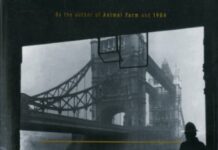
Ebook Info
- Published: 1972
- Number of pages: 128 pages
- Format: EPUB
- File Size: 7.16 MB
- Authors: George Orwell
Description
Before he authored the dystopian 1984 and the allegorical Animal Farm, George Orwell was a journalist, reporting on England’s working class — an investigation that led him to examine democratic socialism. In the 1930s, the Left Book Club, a socialist group in England, sent George Orwell to investigate the poverty and mass unemployment in the industrial north of England. Once there, he went beyond the requests of the book club, to investigate the employed as well. Orwell chose to live as the coal miners did — sleeping in foul lodgings, subsisting on a meager diet, struggling to feed a family on a dismal wage, and going down into the hellish, backbreaking mines. What Orwell saw clarified his feelings about socialism, and in The Road to Wigan Pier, he pointedly tells why socialism, the only remedy to the shocking conditions he had witnessed, repelled “so many normal decent people.” “Orwell’s code was a simple one, based on truth and ‘deceny’; he was important — and original — because he insisted on applying that code to his own Socialist comrades as well as to the class enemy…It is the best sociological reporting I know.”—The New Yorker
User’s Reviews
Reviews from Amazon users which were colected at the time this book was published on the website:
⭐Publication date: 1937Orwell went to mining country to report on conditions for the Left Book Club. What he turned in displeased the publisher, Victor Gollancz so much that he wrote a foreword disavowing Orwell’s strictures on socialism (which we’ll get to).The reportage is basically the first half of the book, and it is good writing, very vivid.The whole book is not like this, but I have to quote this paragraph:I remember a winter afternoon in the dreadful environs of Wigan. All round was the lunar landscape of slag-heaps, and to the north, through the passes, as it were, between the mountains of slag, you could see the factory chimneys sending out their plumes of smoke. The canal path was a mixture of cinders and frozen mud, criss-crossed by the imprints of innumerable clogs, and all round, as far as the slag-heaps in the distance, stretched the “flashes”—pools of stagnant water that has seeped into the hollows caused by the subsidence of ancient pits. It was horribly cold. The “flashes” were covered with ice the colour of raw umber, the bargemen were muffled to the eyes in sacks, the lock gates wore beards of ice. It seemed a world from which vegetation had been banished; nothing existed except smoke, shale, ice, mud, ashes and foul water. But even Wigan is beautiful compared with Sheffield.More typical is an observation like this:As for pubs, they are banished from the housing estates almost completely, and the few that remain are dismal sham-Tudor places fitted out by the big brewery companies and very expensive. For a middle-class population this would be a nuisance—it might mean walking a mile to get a glass of beer; for a working-class population, which uses the pub as a kind of club, it is a serious blow at communal life. It is a great achievement to get slum-dwellers into decent houses, but it is unfortunate that, owing to the peculiar temper of our time, it is also considered necessary to rob them of the last vestiges of their liberty. The people themselves feel this, and it is this feeling that they are rationalising when they complain that their new houses—so much better, as houses, than those they have come out of—are cold and uncomfortable and “unhomelike.”We haven’t got to the socialists yet, because Orwell then makes some observations on class, particularly his class, which was ‘educated,’ but not wealthy. Some of this section reminded me of Keep the Aspidistra Flying, a novel Orwell wrote on the same theme. His conclusion is this:The fact that has got to be faced is that to abolish class-distinctions means abolishing a part of yourself. Here am I, a typical member of the middle class. It is easy for me to say that I want to get rid of class-distinctions, but nearly everything I think and do is a result of class-distinctions. All my notions—notions of good and evil, of pleasant and unpleasant, of funny and serious, of ugly and beautiful—are essentially middle-class notions; my taste in books and food and clothes, my sense of honour, my table manners, my turns of speech, my accent, even the characteristic movements of my body, are the products of a special kind of upbringing and a special niche about half-way up the social hierarchy. When I grasp this I grasp that it is no use clapping a proletarian on the back and telling him that he is as good a man as I am; if I want real contact with him, I have got to make an effort for which very likely I am unprepared. For to get outside the class-racket I have got to suppress not merely my private snobbishness, but most of my other tastes and prejudices as well.Well into the book now, the quote I was looking for. It may ring some bells:One sometimes gets the impression that the mere words “Socialism” and “Communism” draw towards them with magnetic force every fruit-juice drinker, nudist, sandal-wearer, sex-maniac, Quaker, “Nature Cure” quack, pacifist and feminist in England. One day this summer I was riding through Letchworth when the bus stopped and two dreadful-looking old men got on to it. They were both about sixty, both very short, pink and chubby, and both hatless. One of them was obscenely bald, the other had long grey hair bobbed in the Lloyd George style. They were dressed in pistachio-coloured shirts and khaki shorts into which their huge bottoms were crammed so tightly that you could study every dimple. Their appearance created a mild stir of horror on top of the bus. The man next to me, a commercial traveller I should say, glanced at me, at them, and back again at me, and murmured, “Socialists,” as who should say, “Red Indians.” He was probably right—the I.L.P. were holding their summer school at Letchworth. But the point is that to him, as an ordinary man, a crank meant a Socialist and a Socialist meant a crank.And a bonus quote:The truth is that to many people, calling themselves Socialists, revolution does not mean a movement of the masses with which they hope to associate themselves; it means a set of reforms which “we,” the clever ones, are going to impose upon “them,” the Lower Orders. On the other hand, it would be a mistake to regard the book-trained Socialist as a bloodless creature entirely incapable of emotion. Though seldom giving much evidence of affection for the exploited, he is perfectly capable of displaying hatred—a sort of queer, theoretical, in vacuo hatred—against the exploiters. Hence the grand old Socialist sport of denouncing the bourgeoisie. It is strange how easily almost any Socialist writer can lash himself into frenzies of rage against the class to which, by birth or by adoption, he himself invariably belongs.The reason I am lengthening this review with so many quotes is that I actually finished the book over a year ago, but reading my highlights has reminded me how rich it is. Well worth reading, especially for anyone who has enjoyed other books by George Orwell.
⭐Most folks only know the great Orwell through Animal Farm and 1984 (or at the very least, they associate him with them) but his earlier material is essential reading for insight to his socialist beliefs. His colorful, honest style of reportage whilst lodging, eating, working and living amongst the coal miners in England’s north country provides a harrowing account of workers’ struggles and tragedies and a scathing rebuke of capitalist greed and apathy toward it’s labor force. You could almost taste the coal dust and breathe the fetid air with his descriptive detail.
⭐The first half of the book contains some great descriptions of what it was like to work in a coal mine in the early 1900’s. Now it’s worth reading just for that, but that’s mostly in chapters 2 and 3. He says they used to work naked. I thought that was awesome. But the whole second half of the book is basically an essay about the workers parties of his day. Basically he says they appeared to outsiders as disingenuous and weirdos (though the case is strong enough he pretty clearly believes it himself). Here are a couple of choice quotes:”The ordinary man may not flinch from a dictatorship of the proletariat, if you offer it tactfully; offer him a dictatorship of the prigs, and he gets ready to fight.” (Yes, I had to look up the meaning of “prig” too)”Here you come upon the important fact that every revolutionary opinion draws part of its strength from a secret conviction that nothing can be changed”
⭐Another great autobiographical story from a legendary writer. Orwell goes to live in the mining districts that were all over Northern England during his time. This book shows that despite the employment of all the figures that Orwell encounters, that doesn’t mean they were all living healthy lives. The people that Orwell meets are practically borderline homeless. The environments they sleep in are incredibly dirty with poor hygiene and long hours of being on your feet just to survive. Orwell eventually goes in the advocation of Socialism towards the last half of the book and as boring as that may sound, I can tell you that the way he writes keeps you intrigued on what he has to say about it. There is no doubt that a good majority of the problems Orwell complains about are slightly dated but there are still some aspects that can be applied to the modern day’s world. If you’re already a fan of Orwell, you probably already know that this book is for you.
⭐In this book, Orwell (then socialist) makes a case for why he originally thought the world needed socialism. That is the first half of the book. On the second half, however, Orwell makes a case for the devil’s advocate and raises the points that anti-socialist parties might make. He does this so well and learns so much about himself and the socialist party at the time that he eventually leaves the left book club (a club that would publish a socialist book once a month) and scurries to his proper place to join the critics of socialist ideas.
⭐Even the most ardent George Orwell fan would admit that this book would do well with some editing. “The Road to Wigan Pier” is essentially two books, the first is an account of life in the industrial midlands and north. In this section it is unflinching in its account of the poverty and desperation which drives people to actions such as risking their lives in the mines. The section on how when a man dies in the mines, all the other men contribute money from their wages to the widow is harrowing. That simple fact that it happens so often there is a stamp for it is shocking in the extreme.The second half is an interesting, often funny account of why people are turned off the socialist cause. I had many a moment where I laughed out loud, particularly at these kind of quotes:”It would help enormously, for instance, if the smell of crankishness which still clings to the Socialist movement could be dispelled. If only the sandals and the pistachio-coloured shirts could be put in a pile and burnt, and every vegetarian, teetotaller, and creeping Jesus sent home to Welwyn Garden City to do his yoga exercises quietly! But that, I am afraid, is not going to happen.””The truth is that, to many people calling themselves Socialists, revolution does not mean a movement of the masses with which they hope to associate themselves; it means a set of reforms which ‘we’, the clever ones, are going to impose upon ‘them’, the Lower Orders.”Whether you agree or not, you have to admit at times Orwell had a point and that point persists today.As I indicated, the structure of the book feels a bit clunky though. My advice is not to read the forward before reading the book but to read it afterwards. It gives away a lot of the structure and how it was received which I preferred to think about after the event. The reason for the lack of an editing eye was Orwell had left for the Spanish Civil War just before publication.One thing I would say is you don’t have to be hard left to read Orwell, in fact he’s as critical of the hard left as he is of capitalism. Also Orwell is really easy to read and you feel like you’ve read something of note every time you read one of his books.
⭐I’m loathed to give the book 2 stars. I love Orwell’s work and this one is no exception. Orwell’s experience in a coal mining village and his first-hand account of poverty is gripping. However, this Kindle edition is shocking. There are letters missed out and works incorrectly hyphenated. Consider the Gutenberg edition or the paperback edition instead of this one.
⭐This is a vivid and affecting account of the bleak lives of the working class in the industrial north of England. The first half is a set of essays, the first one is on life in a tripe shop come boarding house and is an object lesson in how to write, as is the superb account of working in a coal mine.By modern standards the structure is probably rather shambolic, and it is stronger on personal experience than evidence, but as a writer, Orwell has the ability to just vanish and let the lives of those he is describing come fully alive before you.The second half was not originally published, and it is easy to see why. It is part debate, part rant, about his desire for the rise of socialism. He takes swipes at all and sundry, from nouveau Catholics, to sandal wearing lefties and Quakers in their garden cities. He debates the attractiveness of the English physique and whether the working class smell. Despite this, he comes across as sincere, well intentioned, and uncannily astute on a great many things.After this, Orwell headed off to fight in the Spanish civil war, and he is surely one of the most impressive Britons of the twentieth century.
⭐If you enjoyed “1984” and “Animal Farm”, and want to read more of Orwell’s superb prose, this work of non-fiction is unlikely to disappoint. In the first part, the author pulls no punches in his searing description of the appalling conditions in which many North of England working class people lived between the two world wars. The second part is a sympathetic survey of socialism – a system Orwell would later turn strongly against. Being very much rooted in how things looked at the time, this part is perhaps less accessible to modern readers, but is certainly of historical interest.Overall, very highly recommended.
⭐The Road to Wigan Pier is a book which has been much written about especially in relation to George Orwell, its author, who rose to fame as a result of the successes of his other books: Animal Farm and Nineteen-eighty-four. As I had not read The Road to Wigan Pier, I decided to find out what I had missed.The book is in two parts: Part One is the story of his living among the unemployed of Northern England in 1935. As I was alive in the 1930s, the son of a father who was unemployed for two years, what George Orwell reports strikes a chord in my memory, though I lived in Southern England at the time. He describes in detail the appalling conditions in which the working class unemployed lived in Lancashire and Yorkshire. Yet in so doing, he is unable to distance himself from his middle class upbringing, and this is manifest in his comments on the people he lived with.Part Two is an attempt to indicate how socialism might remedy the situation. It also contains his analysis of why the then existing left wing parties would not succeed in bringing about socialism in the UK. Again his own prejudices come out in this analysis, for example, he is obsessed by the social class issue, and he seems to dislike vegetarians, Quakers and sandal wearers! There is also a tendency for Orwell to repeat himself, consequently, Part Two is overlong for what he has to say .Thus although there is a hint in this book of the intellectual promise of his later works, apart from the revelation of the poverty of the northern working class in Part One, this book is not, in my view, a classic.
Keywords
Free Download The Road To Wigan Pier in EPUB format
The Road To Wigan Pier EPUB Free Download
Download The Road To Wigan Pier 1972 EPUB Free
The Road To Wigan Pier 1972 EPUB Free Download
Download The Road To Wigan Pier EPUB
Free Download Ebook The Road To Wigan Pier




